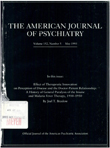Serotonin function and treatment response to clozapine in schizophrenic patients
Abstract
OBJECTIVE: Clozapine is the only compound proven to be effective in the 20% of schizophrenic patients refractory to treatment with conventional neuroleptics. Although its mechanism of action has not been elucidated, clozapine appears, in contrast to most conventional neuroleptics, to be a potent serotonin (5-HT) antagonist. This study hypothesized that 5-HT function is increased in patients who benefit from clozapine treatment relative to patients who fail to improve on it. METHOD: The 5-HT receptor agonist m-chlorophenylpiperazine (MCPP) was used as a probe to examine 5-HT function. MCPP (0.35 mg/kg p.o.) was administered in a placebo-controlled design after a 3-week drug-free period to 19 schizophrenic patients. ACTH, prolactin, body temperature, behavior, and MCPP blood level were measured. Patients were then treated with a conventional neuroleptic, and, having failed to respond to it, were treated with clozapine for 5 weeks (up to 600 mg/day). RESULTS: Patients who responded to clozapine had significantly higher ACTH responses to MCPP during the drug-free state than the patients who failed to benefit from clozapine. Moreover, the degree of improvement with clozapine, particularly the improvement in psychotic symptoms, was strongly correlated with the magnitude of MCPP-induced ACTH release. Other MCPP-induced responses and MCPP blood level were similar for the two groups and did not correlate with the degree of symptomatic improvement with clozapine. CONCLUSIONS: Results of this study suggest that MCPP-induced ACTH release, and by inference 5-HT receptor function, may be increased in patients who benefit from treatment with clozapine relative to patients who fail to improve on this drug.
Access content
To read the fulltext, please use one of the options below to sign in or purchase access.- Personal login
- Institutional Login
- Sign in via OpenAthens
- Register for access
-
Please login/register if you wish to pair your device and check access availability.
Not a subscriber?
PsychiatryOnline subscription options offer access to the DSM-5 library, books, journals, CME, and patient resources. This all-in-one virtual library provides psychiatrists and mental health professionals with key resources for diagnosis, treatment, research, and professional development.
Need more help? PsychiatryOnline Customer Service may be reached by emailing [email protected] or by calling 800-368-5777 (in the U.S.) or 703-907-7322 (outside the U.S.).



